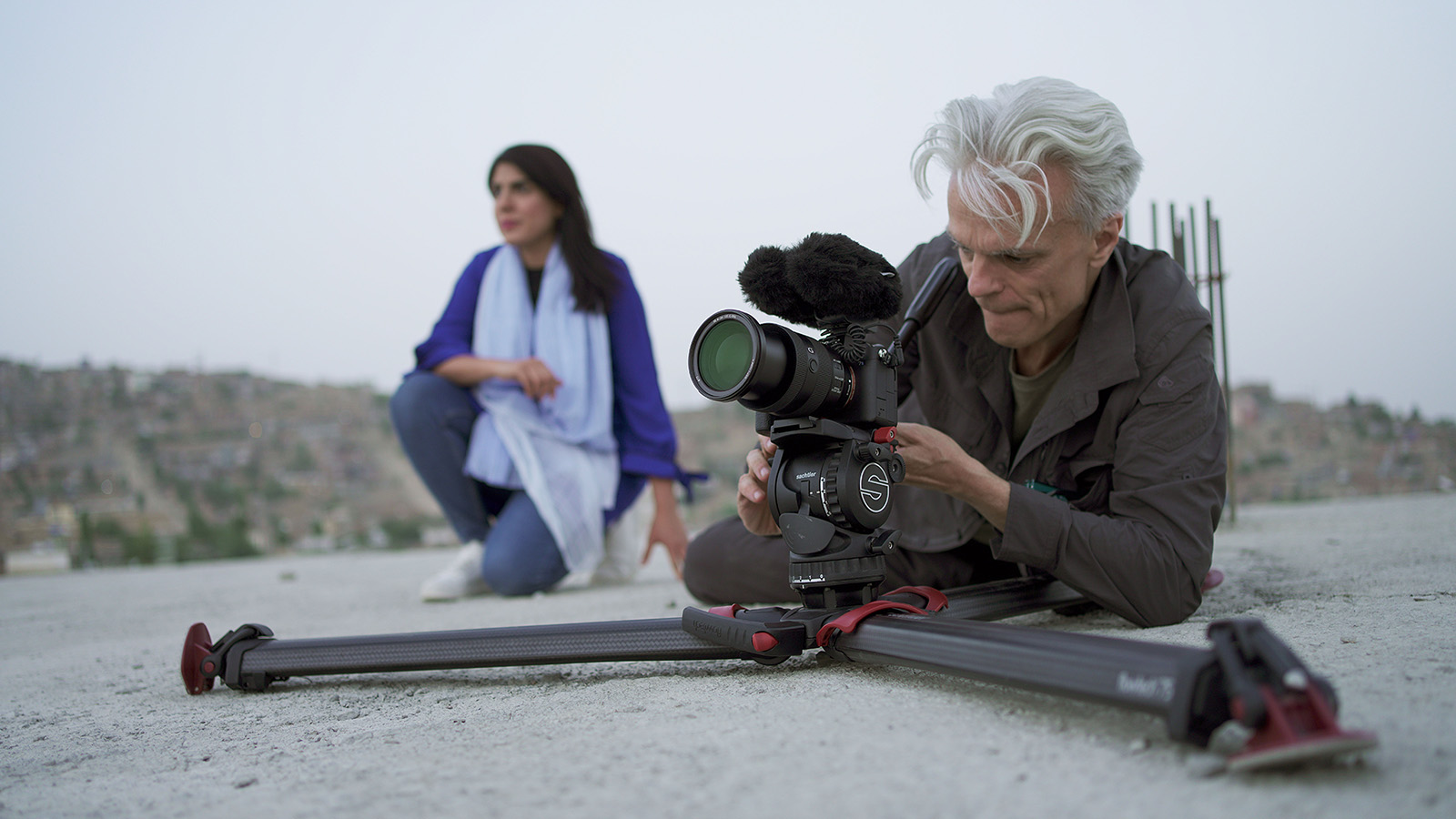Creativity in Adversity: Celebrating Music and Culture
“Female Voice of Afghanistan” is a film project that showcases the music, environment, stories, and perspectives of Afghan women. The project was the concept of Yalda Yazdani, a music ethnomusicologist who wanted to preserve old songs and traditions. Director and Producer, Andreas Rochholl was inspired by Yalda’s idea and joined her together with Afghan-German journalist Sharmila Hashimi in creating the film project. The often harsh and fast-changing conditions demanded production equipment to match. Sachtler’s flowtech aktiv system was high on their list.
A song of nine lives
Sebastian Leitner, the creative director, and editor, explains the project is all about music. Although it tells stories about the environment, emotions, and perspectives of the women featured in the film. “Taking religion and politics out of the equation results in a friendlier and more inviting communication and feedback,” he says. “The film aims to take its viewers on a positive journey of learning about another culture through music.”

They did most of the filming in Kabul when the situation in Afghanistan was changing from day to day. Bamyan, a town 150 miles east of Kabul, was originally in the plan, but the political unrest made the suburbs too dangerous. Unable to leave Kabul, they relied on people arriving in the city and sharing their stories from the rest of the country. The film features nine women from Kabul, and one from Bamyan: Mashal Arman, Rouya Doost, Gulshan, Freshta Farokhi, Sumaia Karimi, Sadiqa Madadgar, Naria Nour, Wajiha Rastagar and Ghawgha Taban.

No one could have guessed at the time that this would be the last opportunity to document the lives of these female artists before the collapse of the republic. The speed of the dramatic changes surprised even the protagonists, but this did not deter them from participating in the project.
Resolute Support
For Sebastian and Andreas, filming in Afghanistan was challenging, but carefully handpicking their equipment helped them overcome these challenges. To concentrate on the story, they needed equipment that was easy to use and did not distract them. While filming with an iPhone was an option, they needed equipment that would give them more options and better quality. To support their Sony A7 Mk III and 4k rx0 II cameras, they chose a Sachtler flowtech aktiv system, which was fast to use and balance, and provided the right weight and stability needed in harsh conditions.
As a long-time Sachtler user, Sebastian recommended the flowtech aktiv system to Andreas. “I know the way Andreas works,” he says. “He throws himself to the ground and rolls around and from every angle to capture the frame he wants. I said there is a unique Sachtler tripod that is perfect for you.” The flowtech tripod‘s flexibility with the aktiv head to go from virtually flat on the ground to full height quickly with no effort made it a must-have for their project. “For our needs, this is exactly what we were looking for,” says Sebastian. “We must be very flexible and pack light. We need the minimum amount of equipment with the most flexibility.”
Going the extra mile
In the rugged terrain of Afghanistan, where towering peaks loom over the landscape, capturing the perfect shot can be a challenge. Andreas needed to navigate the complex interplay between subject and setting, deliberating the composition of each frame. “With a mountainous horizon, framing a shot that conveys a sense of freedom and openness can be difficult,” says Andreas. “But as any seasoned filmmaker knows, there are ways to use this dynamic to your advantage. By positioning a subject’s head above the horizon line, you can create a sense of empowerment and liberation.” He adds, “In a place like Afghanistan, where the mountains dominate the skyline, adjusting the horizon line is easier said than done. To capture the perfect shot, you must go the extra mile – or rather, the extra altitude – to bring the horizon line down to the level of your subject.” That’s where the flexibility of flowtech comes in.

flowtech provides exactly the right balance to give the flexibility to not even think twice
– Sebastian Leitner – Creative Director
Don’t think twice
In Afghanistan, Andreas faced the challenge of doing much of the production alone, carrying all the equipment himself. He needed a lightweight and practical tripod that he could set up quickly in dangerous situations. The Sachtler tripod was his saving grace, fast and sturdy, allowing him to capture footage in just one tense minute outside the safety of a vehicle. “I have to ask myself, what do I really need to have a good quality result? What is not too heavy? What is practical?” says Andreas. “Of course, the 10kg bag with a tripod was 10kg, not 14kg. This makes a difference when you carry it every day. Like when you make a survival kit with a backpack – every kilo makes a difference.” Sometimes, though, a little weight is good. Sitting at an elevation of 1,800m in a narrow valley in the Hindu Kush, Kabul is one of the highest capital cities in the world and very windy. “A tripod needs weight, or your camera shakes from the wind,” says Sebastian. “flowtech has enough weight to give stability but it is not so heavy that I have to think about it. As a cameraman, I must think about things like the sunrise. Give me five minutes and I’ll run up a hill to get the perfect shot. When a tripod is too heavy, you think twice about running up with a tripod alone. flowtech provides exactly the right balance to give the flexibility to not even think twice.”

For Andreas, the tripod is not just a piece of equipment; it extends his body. He trusts it completely, and it allows him to adjust his camera’s angle and position quickly and easily. “It’s not just about the weight,” he says. “Everyone who works with a camera knows your body camera and tripod need to be as one. One body, it’s like riding a bicycle, you and the bicycle must become one, you don’t think it’s intuitive, my hands know the tripod like a body. This is nothing new. What is new is the flowtech needs only seconds to build up and those seconds are very important when you are on location in a dangerous situation.” Sebastian adds, “I could tell that people who really know and understand how camera operators work developed the tripod. I can’t think of a way to make it better.”
flowtech needs only seconds to build up and those seconds are very important when you are on location in a dangerous situation.
– Andreas Rochhall – Director

It’s really about music
The team is creating a new format that is not a documentary or a TV series but a TV gala show with social media events. “We want to be sensitive but also entertaining,” says Andreas. “We add value to the audience, and help the people featured in the film project tell their stories, not use their stories.” Sebastian adds, “We invite people to take a positive journey with all the emotions where you might get sad or angry and really get to think about it, but in the end, it’s wow I learned something today and it’s really about music.” The video series where Afghan female singers, introduced by cinematic portrait films, perform concerts, and virtually meet Europe-based musicians to create fusion songs, is available on YouTube and has already received over 2.5 million views.
A visual story through art and technology
In a land of towering peaks and sweeping vistas, the art of visual storytelling takes on a whole new level of complexity. But with skill and determination, talented filmmakers can transform even the most challenging landscapes into stunning works of cinematic art. Andreas and Sebastian’s attention to detail, use of quality equipment, and adaptability allowed them to capture quality footage that stands out from other films from the region. “Technology should help people have a better life,” says Andreas. “To make a difference and use time for important things. flowtech does that.” Female Voice of Afghanistan is a testament to their commitment to their craft and their ability to overcome challenges in challenging environments.
‘Life after Life: Arrival Germany’ is the sequel to the virtual music festival The Female Voice of Afghanistan. The film team accompanied nine Afghan female singers. In very personal video portraits, they make their music and voices heard talking about their lives and everyday life in Kabul and their new lives in Berlin.
View the “Female Voice of Afghanistan” series below or watch on YouTube here





